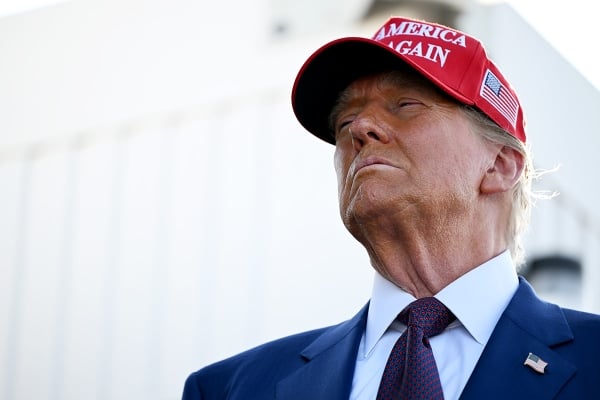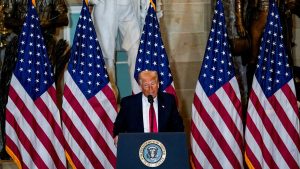College professors and university diversity officers are teaming up with nonprofits and local governments to challenge President Trump’s executive orders that target diversity, equity and inclusion programs in the federal government, higher education and the private sector. Those orders, they argue, violate the U.S. Constitution and have already caused much uncertainty on college campuses.
The American Association of University Professors, the National Association of Diversity Officers in Higher Education and other groups argue in a lawsuit filed Monday that the orders exceed executive legal authority, violate both the First and Fifth Amendments, and threaten academic freedom and access to higher education for all. They want a judge to declare that the executive orders are unconstitutional and to block the government from further enforcement.
“In the United States, there is no king,” the plaintiffs say in the 40-page complaint. “In his crusade to erase diversity, equity, inclusion, and accessibility from our country, President Trump cannot usurp Congress’s exclusive power of the purse, nor can he silence those who disagree with him by threatening them with the loss of federal funds and other enforcement actions.”
Filed in the U.S. District Court in Maryland, the lawsuit is the first to target the DEI-related orders. Numerous states and nonprofits, however, have sued the Trump administration to challenge other executive actions taken during the president’s first two weeks in office, including his attempt to freeze trillions of dollars in federal grants and loans.
The academic organizations involved in this DEI case are represented by Democracy Forward, the same pro bono legal group that was first to successfully challenge the federal funding freeze. Asian Americans Advancing Justice, another nonprofit civil rights group, also is representing the plaintiffs.
The executive orders at issue in this lawsuit aim to end what Trump sees as “illegal discrimination” and “wasteful” programs. Institutions that don’t comply could face financial penalties or federal investigations.
Although AAUP has openly discouraged universities from engaging in “anticipatory obedience,” which it defined as “acting to comply in advance of any pressure to do so,” several colleges and universities have already taken action in an attempt to avoid rebuke from the Trump administration. That includes canceling a Lunar New Year event and removing references to DEI from college websites.
Trump’s orders are not the first of their kind. They build on a number of laws recently passed in Republican-led states that ban DEI offices and programs in colleges and universities and aim to take those efforts nationwide. Colleges in states like Alabama, Florida, Iowa, Texas and Utah have taken action to comply with those laws, laying off staff and shutting down cultural centers. In some states, such as Kentucky and Michigan, public colleges dissolved certain DEI standards or full offices before legislation passed.
Regardless of the state-by-state scenarios, groups like NADOHE say they will continue to fight for DEI protection, as such programs are crucial to fulfilling the mission of higher education. Getting rid of DEI, NADOHE says, would send a chilling shock wave throughout academia and lead to increased harassment, discrimination and violence across campuses.
“By attacking the important work of diversity, equity and inclusion offices at educational institutions, the order seeks to dismantle critical support systems for historically underrepresented students,” NADOHE president Paulette Granberry Russell told Inside Higher Ed after Trump signed the second DEI order. “This would limit workforce preparation and stifle efforts to address systemic inequities. This order depicts diversity, equity and inclusion as divisive when, in reality, these initiatives aim to ensure opportunity for all.”
What Does the Lawsuit Say?
The lawsuit is focused on two executive orders that Trump issued during his first 48 hours in office.
The first order directed federal agencies to get rid of all federal diversity offices and positions and end any “equity-related” grants and contracts. Numerous DEI staffers have since lost their jobs, and dozens of general staff members from the Education Department who attended any DEI training in the past have been put on administrative leave.
The lawsuit alleges that Trump exceeded his legal authority in issuing that order, as Congress—not the president—has authority over the federal government’s purse strings. Therefore, the plaintiffs argue, Trump does not have the power to unilaterally terminate equity-related grants and contracts “without express statutory authority.”
The second order, signed Jan. 21, more directly impacts higher education. It calls on all agencies—including the Department of Education—to “enforce our longstanding civil-rights laws and to combat illegal private-sector DEI preferences, mandates, policies, programs, and activities.” It also orders the attorney general and the education secretary to create guidance for colleges and universities on how to comply with the 2023 Supreme Court ruling against affirmative action, and for the secretary to investigate up to nine colleges that have endowments worth more than $1 billion as part an effort “to deter DEI programs or principles.
The lawyers argue that both orders are overly vague. Neither defines terms such as “DEI,” “illegal DEIA” or “equity.” As a result, they argue, colleges, universities and other institutions have not been given fair guidance as to what is prohibited and what they could be indicted and face penalties for, violating the plaintiffs’ right to due process under the Fifth Amendment. “The lack of definitions necessarily requires people of common intelligence to guess as to what is prohibited,” the lawsuit states. It goes on to suggest that by ordering the investigation of “illegal DEIA” practices at up to nine colleges without first defining the term, the president has granted agencies “carte blanche authority to implement the order discriminatorily.”
The plaintiffs also argue that the second order violates the First Amendment, discouraging free speech and academic freedom around DEI-related topics on campus—dampening the public service role of academia as a marketplace of ideas. “The Constitution protects the right of scholars, teachers, and researchers to think, speak, and teach without governmental interference,” the plaintiffs write. “The ‘essentiality of freedom in the community of American universities is almost self-evident’ and educators play a ‘vital role in a democracy’.”
Can Trump ‘Avoid Running Afoul’?
AAUP president Todd Wolfson said the association is committed to fighting for a higher education system that’s accessible to all, regardless of background. He went on to describe Trump’s orders as “destructive” and said that eliminating DEI at public institutions would threaten the democratic purpose of higher ed.
“Trump’s orders are about controlling the range of ideas that can be discussed in the classroom, limiting and censoring faculty and students, and codifying into law the prejudices of the past,” he said in a statement to Inside Higher Ed. “These are attempts at authoritarianism that this nation has overcome before. We will do so again.”
But Tyler Coward, lead counsel for government affairs at the Foundation for Individual Rights and Expression, a First Amendment advocacy group, isn’t so sure. He said in an email statement that Trump’s executive orders on DEI “appear to avoid running afoul of the First Amendment,” but in a more detailed analysis memo, FIRE warns that “implementation should proceed carefully.”
“Overzealous enforcement could threaten free speech by, for example, indirectly chilling a professor from sharing their positive views of affirmative action policies or leading to investigation of a government grantee for a social media post expressing personal support for DEI initiatives,” the foundation wrote.
Neither Coward nor the foundation at large, however, commented on the lawsuit’s standing as far as violations of the Fifth Amendment or the separation of powers.
“We are concerned that the executive order about gender ideology could be used to censor speech on sex and gender,” Coward said. “FIRE is closely watching how federal agencies interpret and enforce the executive orders to ensure the government doesn’t infringe on constitutionally protected speech.”








